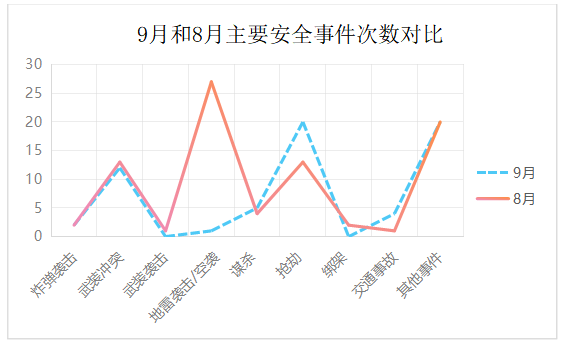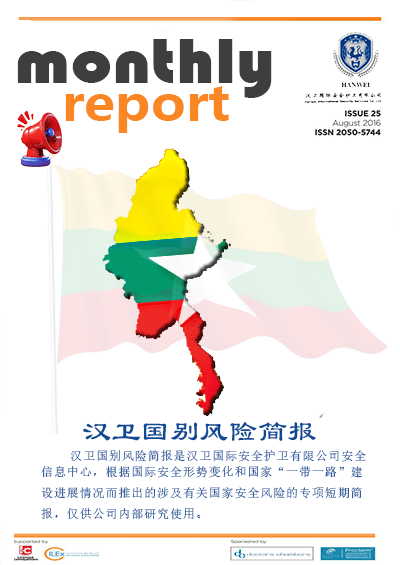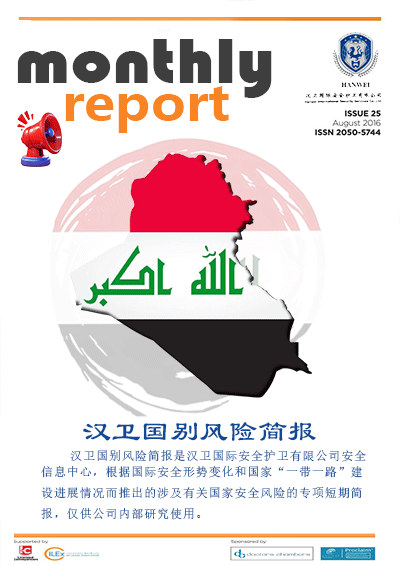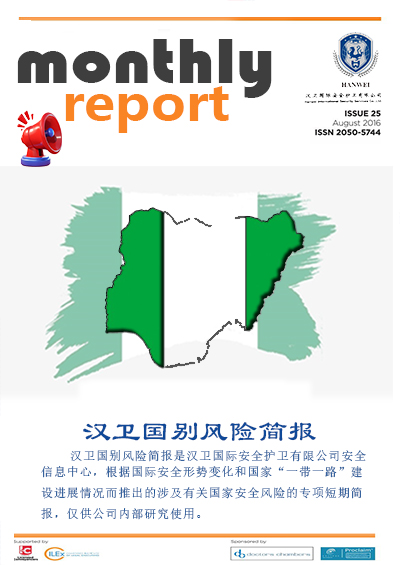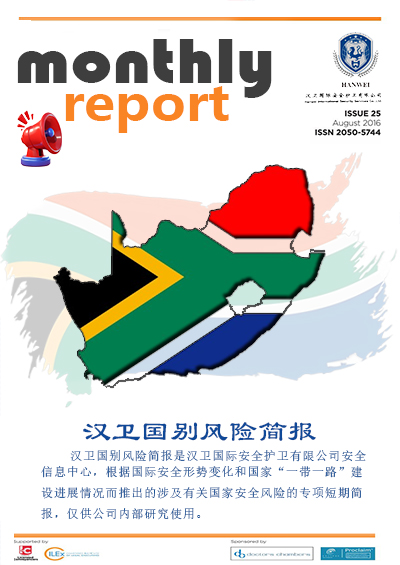Myanmar Risk Monthly Report (September)
According to the security public opinion report released by Hanwei International, a total of 136 representative security incidents of various types were recorded in Myanmar in September, 11 more than in August. These incidents resulted in 85 deaths and 92 injuries. Among the categorized security incidents, armed conflicts and shootings were the primary types, with most incidents occurring in Shan State, Yangon, and other regions.
Hanwei International’s analysis points out that the Myanmar military announced the recapture of Kyaukme—a key town in northern Myanmar—from the Ta’ang National Liberation Army (TNLA). This marks another major military victory following the government forces’ recapture of Bhamo. In the long run, Myanmar’s security situation remains tense. From a statistical perspective, the number of security incidents increased slightly compared with the previous month, while the death toll and injury count decreased. This is mainly due to a reduction in armed conflicts, which led to a corresponding drop in casualties.
I. Myanmar’s Busy Diplomatic Agenda
According to reports from Myanmar’s official media, Myanmar and Russia recently signed multiple cooperation agreements in two high-tech fields: nuclear energy and aerospace. Senior General Min Aung Hlaing—Myanmar’s Acting President and Chairman of the State Administration Council—attended the signing ceremony and witnessed this important progress in bilateral cooperation.
On the afternoon of September 1, 2025, Senior General Min Aung Hlaing (Acting President and Chairman of the State Administration Council) participated in the "SCO PLUS MEETING" in Tianjin, China. He held meetings with leaders from over 20 countries—including Russian President Vladimir Putin and Indian Prime Minister Narendra Modi—and heads of more than 10 international organizations. Beyond the formal meetings, the Chairman also had "casual encounters" and discussions with leaders of several countries. Since the 2021 Myanmar coup, this was the first grand event where Myanmar’s senior officials shared the stage with so many international leaders.
September proved to be a busy month for Myanmar’s senior leadership’s foreign visits. On September 6, the Chairman of the State Administration Council (Acting President) had just returned from a visit to China; on the morning of September 14, Myanmar’s Prime Minister departed from the National Defense Airport in Naypyidaw (the capital) for Nanning City, Guangxi Zhuang Autonomous Region, China. The delegation, led by Prime Minister U Win Shein, traveled to Nanning to attend the 22nd China-ASEAN Economic and Investment Summit Forum. The delegation also included several federal ministers and chief administrators of states/regions (i.e., governors). Upon arrival in Nanning, the delegation received a high-level welcome ceremony once again, reflecting the close relations between China and Myanmar.
On September 17, a delegation led by the Commander-in-Chief of the Royal Thai Air Force (accompanied by his wife) arrived in Naypyidaw for an official visit to Myanmar, invited by the Commander-in-Chief of the Myanmar Defense Services Air Force, General Tun Aung. Senior officials of the Myanmar Defense Services went to the airport to greet the delegation.
According to information from Myanmar’s Ministry of Foreign Affairs, Bendito Freitas—Minister of Foreign Affairs and Cooperation of Timor-Leste—paid an official visit to Myanmar from September 17 to 19. During a meeting with Myanmar’s Minister of Foreign Affairs, U Than Swe, in Naypyidaw, the Timorese Foreign Minister stated: "Timor-Leste is willing to establish formal relations with the Republic of the Union of Myanmar and welcomes Myanmar to open an embassy in Timor-Leste." He also pledged: "Timor-Leste will never allow any contact with organizations opposing the Myanmar government, nor permit the establishment of their offices or any illegal activities." Finally, the two sides discussed the issue of mutual visa exemption between the two countries.
II. Strict Screening to Ensure the Smooth Progress of the General Election
On September 9, 2025, the Union Election Commission (UEC) of Myanmar issued Announcement No. 95 of 2025, stating that in accordance with relevant provisions of the Political Party Registration Law, it had revoked the registration qualifications and dissolved four political parties: the National Democratic Force (NDF), the Democratic National Party (DNP), the Women Party (Mon), and the Union Farmers and Workers League Party (UFLP).
Among the original 9 national political parties scheduled to participate in the federal general election on December 28, 2025, only 6 retained their eligibility to run. These include the Union Solidarity and Development Party (USDP), the People’s Pioneer Party (PPP), the People’s Party (PP), the Shan Nationalities Democratic Party (SNDP), the Myanmar Farmers Development Party (MFDP), and the National Unity Party.
According to news released by the Press Team of the Defense and Security Committee, the Taunggyi Township Court of Myanmar sentenced U Nay Htwe—a 36-year-old man residing in Ward 1, Edda Ya City, Taunggyi Township, Shan State—on September 9 in accordance with Article 23 (a) of the Law for the Protection of Elections from Sabotage. Additionally, 9 men in Yangon Region and Kayah State have been placed under investigation on charges of interfering with, obstructing, and sabotaging the phased multi-party democratic general election scheduled for December 28 this year, with the intent to disrupt its normal conduct.
Members of the security forces are conducting investigations, exposing, and taking effective actions to crack down on activities intended to sabotage the smooth progress of the 2025 multi-party democratic general election. Such activities include interference, obstruction, and sabotage in the form of social media posts, speeches and remarks in public places, mobilization and incitement, demonstrations and protests, written messages, and posted images and posters—all in accordance with the Law for the Protection of Multi-Party Democratic Elections from Interference and Obstruction.
It is reported that when responding to media inquiries recently, the Union Election Commission (UEC) of Myanmar stated that political parties planning to run in elections nationwide must submit candidate lists for all 833 parliamentary constituencies across the country, and the actual number of constituencies they contest must exceed half (i.e., no fewer than 417). If this requirement is not met, the party’s qualification will be revoked in accordance with the law. On September 14, the Union Election Commission issued a notice stating that elections for members of the Pyithu Hluttaw (House of Representatives), Amyotha Hluttaw (House of Nationalities), and state/region hluttaws will not be held in 121 constituencies across Myanmar.
III. Boosting Economic Development to Stabilize the Domestic Market
According to reports from Myanmar’s official media, the Central Bank of Myanmar (CBM) has recently continued to intervene in the foreign exchange market to ensure the import of key commodities. On September 23, the central bank announced an injection of US$22 million into the fuel oil industry; on the same day, it sold US$800,000 to edible oil importers and US$99,000 to fuel oil importers. These measures aim to stabilize the foreign exchange market and curb exchange rate fluctuations.
Data from the Directorate of Investment and Company Administration (DICA) shows that during the 2025-2026 fiscal year (April to August), Myanmar attracted approximately US$129 million in foreign direct investment (FDI), nearly reaching US$130 million. Within these five months, 32 new foreign-invested projects entered Myanmar.
According to information released by Myanmar’s Ministry of Finance and Revenue, the country has established a special fund of 170 billion kyats to support the development of micro, small, and medium-sized enterprises (MSMEs). The review and disbursement of relevant loan applications are progressing in an orderly manner. At a briefing in Naypyidaw on September 17, Deputy Minister of Finance and Revenue Daw Than Than Lin disclosed that the special fund consists of 20 billion kyats in development assistance funds and 150 billion kyats in loan support funds, aiming to activate the vitality of local MSMEs through financial means.
On the morning of September 27, at the "World Tourism Day 2025" conference held at the Mingalar Thiri Hotel in Naypyidaw, Myanmar’s Prime Minister U Win Shein attended the event and delivered a speech. The Prime Minister emphasized: "We must make the greatest efforts to develop international tourism!" He called on colleagues in the tourism industry to provide the best services to attract international tourists, and stated that the national government is also offering visa facilitation for international tourists entering Myanmar.
IV. Ongoing Airstrikes and Conflicts, Severe Civilian Casualties
According to Burmese-language media reports, at approximately 1:30 p.m. on September 3, Ban Kyone Village in Hsipaw Township, northern Shan State, was hit by an airstrike. Myanmar military fighter jets dropped two 250-pound aerial bombs; the explosions injured a man named U Maung Zaw, who was hit by shrapnel in his arm, and destroyed two houses. Reports indicate that the area has been hit by more than 10 airstrikes between July 4 and September 3, damaging multiple houses.
At approximately 7:00 p.m. on September 12, a convoy of the TNLA medical team was accurately hit by a Myanmar military drone as it was about to arrive in Kyaukme Township from Hsipaw Township; all nurses on board were killed. Currently, TNLA soldiers on the Kyaukme frontline have suffered extremely heavy casualties, with wounded soldiers and the bodies of the deceased continuously being transported to medical points and crematoriums in Kyaukme City.
According to Burmese-language media reports, at approximately 12:15 a.m. on September 18, a military training school of the Kachin Independence Army (KIA) in Shwegu Township, Kachin State, was hit by a Myanmar military airstrike just before the start of training. The attack killed no fewer than 20 trainee soldiers and injured multiple others.
On September 20, a violent massacre targeting innocent civilians occurred in Salingyi Town, Sagaing Region, Myanmar, which has become a globally shocking humanitarian disaster. Nine women working at a local military family textile factory—including one who was four months pregnant—were brutally killed in an armed attack. This heinous atrocity not only constitutes a flagrant violation of basic human rights but also a serious breach of international humanitarian law, triggering strong outrage and condemnation from the people of Myanmar (both at home and abroad) and the international community.
According to local sources, on September 30, clashes broke out between the Myanmar Defense Services and ethnic armed organizations in Kyaukme City, northern Shan State. Meanwhile, fires broke out at multiple office facilities in the city. The Myanmar Defense Services has been conducting military operations in the Kyaukme area since August 18, and the situation remains fluid.
V. Tuberculosis Prevention and Control & Emergency Contact Information
The person in charge of tuberculosis (TB) prevention and control in Yangon recently told the media that one-third of Myanmar’s TB patients are concentrated in Yangon Region, making it urgent to strengthen prevention and control measures. The person in charge pointed out that many TB infected person show no obvious symptoms and can only be detected through professional examinations.
Hanwei International recommends the following for personnel in Myanmar:
Emergency Contact Information for Myanmar
Chart 1: September Security Incident Classification

Chart 2: September Casualty Classification Statistics

Chart 3: September Security Incident Statistics by Major States/Regions
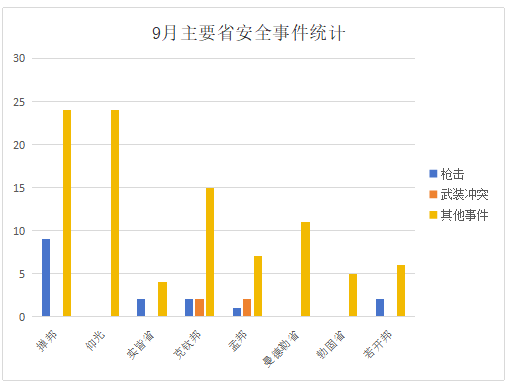
Chart 4: Comparison of Major Security Incident Counts (September vs. August)
